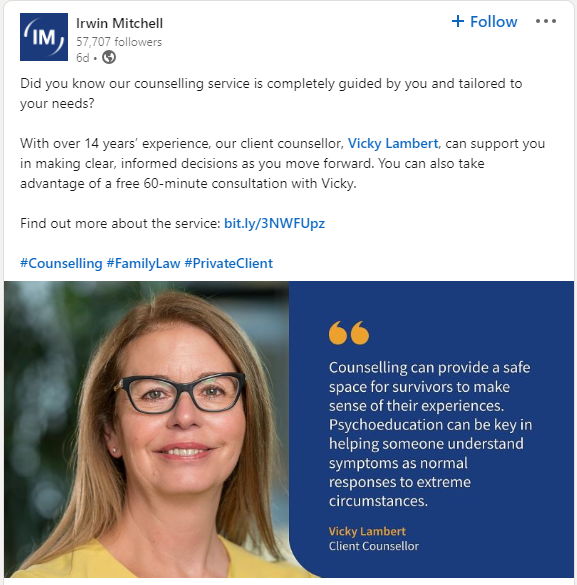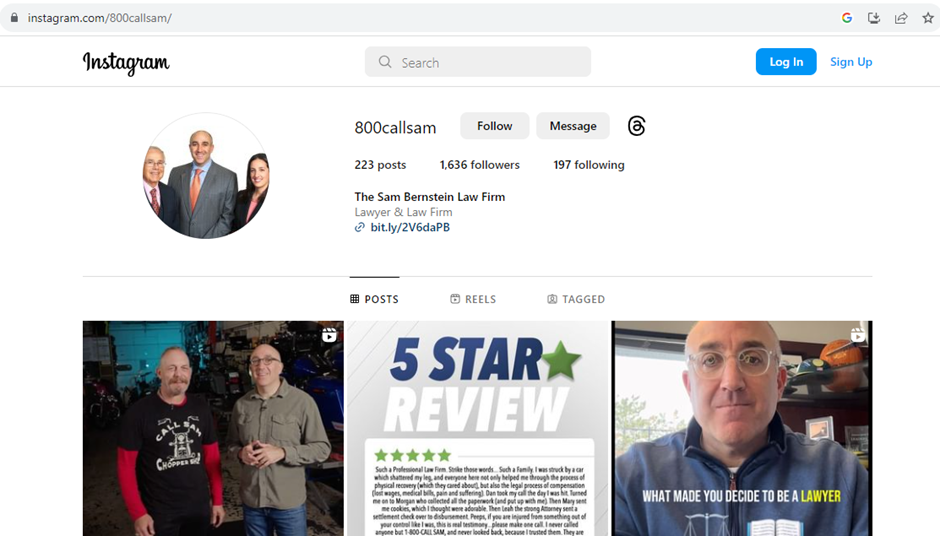Most Business From References! Does a Website or Digital Marketing Even Matter for law firms?

Ralph Waldo Emerson famously said, “the good lawyer is not the man who has an eye to every side and angle of contingency, and qualifies all his qualifications, but who throws himself on your part so heartily, that he can get you out of a scrape.”
Where can you get the “good” lawyers of Emerson’s imagination?
Traditionally, the answer would have been “through references”. But legal needs have diversified and client preferences have evolved. References would have stood a wholly valid choice more than a decade back, but the idea now sounds outdated.
While client references remain relevant— utilized as a resource, the rise of the internet has brought about a shift in the mindset of clients. Online presence plays an undeniable role as an important resource for prospective clients, helping you showcase past buyer contentment and offering insight into your firm’s history.
Thus, a comprehensive approach to client acquisition requires today’s law firms to embrace digital avenues and widen reach through online presence. With it, law firms can break free from the confines of references and fully unlock their true growth potential.
As we move ahead, we discuss references and how they are fading as a choice for law businesses. Then, we talk about the emergence of digital marketing as a viable choice for client discovery and why it’s the necessity for today’s law firms to integrate it into their client acquisition strategies.

Client References in Law Business: Uncovering the Two Facets
References have long been a preferred avenue for law firms to source potential clients. The power of word-of-mouth recommendations cannot be underestimated in the legal industry. When a satisfied client refers a law firm to a friend, family member, or colleague, it carries a weight of trust and credibility. So, references expedite the client acquisition process and establish a foundation of reliability and competence. They come with a personal endorsement, making the decision-making process more seamless for the potential client.
However, with the proliferation of the internet, times have changed and the landscape has evolved dramatically. While references hold their value, they are no longer the primary or sole means of finding legal representation.
The digital age has ushered in an era of instant accessibility and information abundance. Individuals seeking legal services turn to search engines and online platforms to scout for potential lawyers. This shift is fueled by the convenience and efficiency of digital searches. Legal directories, social media presence, blogs, and online reviews are some of the criteria from the extensive list that today’s clients scrutinize before arriving at a decision.
Studies have already shown that when taking the help of the internet, 97% of people would go with online reviews to choose a law business. And while around only 15% people would carry out a Google search to find lawyers, the rapid rise of the use of the internet for client discovery has made almost 84% of law firms increase their spending on digital marketing and technology adoption. Sure, these numbers will rise in no time!
Delving Further: How References Are a Missed Opportunity for Reach and Growth
The reliance on client references, while historically significant, presents a myriad of limitations in the context of modern legal practice. One of the most pronounced repercussions of exclusively depending on references is its tangible impact on a law firm’s reachability. Following points illustrate why references impact reachability in the digital age.
Inability to overcome geographical constraint
References, often rooted in personal relationships and local networks, inherently impose geographical limitations on a law firm’s client acquisition strategy. While these references may generate a steady stream of clients within a specific area, they fail to harness the vast potential beyond local boundaries.
In the US, there are two laws – federal laws and state laws. For cross-state legal matters that transcend geographical boundaries, case clients would seek specialized expertise regardless of location. In such a case, references start posing limitations.
Limited growth potential is the glass ceiling
“A good lawyer is going to try to protect her client,” once said John Kennedy.
But with the competition intensifying law firms cannot merely focus on sustaining their existing clients, rather have to explore channels to maximize the reach to potential clients. References though usually the first choice, as we deliberated, don’t make a reliable channel.
Less than 59 percent of people use references as a channel to find lawyers, and the figure continues to decline. The growth trajectory of a law firm is intricately linked to its ability to expand its client base and seize new opportunities, and references certainly inhibit you from fully reaching the market. Though valuable, the choice may not yield the volume of clients required for sustained growth and prosperity.

High possibility of missing opportunities
Let’s say a client is looking for a lawyer for a complex case. Armed with a smartphone or a computer, he embarks on a journey of research to identify reputable law firms with expertise in their specific concern. A law firm that has invested in a well-designed website, informative blog posts, and engaging content is poised to capture the attention of this potential client.
Conversely, a firm reliant solely on references may not even make it to the radar, losing out on an opportunity to demonstrate its competence and establish a connection. So, mere reliance on references and absence of a robust online presence can translate into missed opportunities of substantial magnitude.
How a Website Becomes a Workhorse for Law Firms
A well-designed and informative website stands as a cornerstone, bridging the gap between traditional client acquisition methods and the demands of the digital age. The modern legal consumer is accustomed to convenience, accessibility, and transparency, all of which a thoughtfully crafted website can deliver. We see how a law firm’s website can work as a potential client acquisition source.
A hub of information
With a website, a law firm transforms itself into a hub of knowledge and insights. Beyond showcasing services, a website can provide crucial information around legal issues. Engaging articles, informative blog posts, frequently asked questions (FAQs), and up-to-date legal updates position the law firm as a thought leader within its practice areas.
By proactively addressing common legal queries and concerns through informative content, a law firm not only educates its audience but also establishes itself as a go-to resource. Potential clients seeking guidance on legal matters are more likely to engage with a law firm that readily provides valuable insights. This transformation from a mere service provider to a trusted advisor sets the stage for meaningful client relationships built on a foundation of expertise.
Paves the way for discoverability
A beautifully designed website when optimized for search engines ensures that it reaches its intended audience. It elevates the business’s chances of being prominently displayed when potential clients search for relevant legal services.
By aligning the website’s content with the language potential clients use to search for legal solutions, a law firm can let the audience find it with ease. This visibility not only attracts organic traffic but also positions the law firm as a credible choice among a sea of options.
A mark of credibility and trust
A website carries the weight of a firm’s professionalism and competence. With a mere click, potential clients can form an impression that influences their perception of the law firm’s abilities.
Moreover, a website serves as a digital business card, showcasing not only the firm’s legal prowess but also its credentials, accolades, and client testimonials. This compilation of credibility factors bolsters trust and creates a sense of assurance that resonates with potential clients as they navigate the decision-making process.
Arnold & Itkin is one great example of how a website is a great tool to equip your audience with informative insights. They let the visitors see their attorneys, the practice areas and also showcase their victories, as you can see on their website.
Makes constant accessibility possible
The hallmark of a website’s influence lies in its constant availability. A law firm’s website provides clients with the freedom to access crucial information at any time. Unlike the limitations of office hours, a website extends its reach beyond temporal confines, catering to the needs of potential clients whenever they arise.
Prospective clients seeking legal services often have pressing questions and urgent matters. This unrestricted accessibility increases the convenience, portraying the law firm as responsive and committed to meeting client needs on their terms.
Delivering Performance Through Digital Presence: Why Digital Marketing Becomes Important
94% of law firms who participated in 2022 ABA Legal Technology Resource Center’s Legal Technology Survey had a website. Websites have become a dire need for law firms which is propelling most law firms, including small and medium ones, to have a website.
But then, having a website would be of little value if you are not actively promoting insightful content on it, or not initiating the right steps to make it discoverable to your target audience.
And what about social media? Attempting to build presence through a website is one step, having limited or no activity on social media will make your audience see the lack of digital literacy.
Adopting a holistic digital marketing strategy can help you find answers to these challenges. So, complement your digital presence with the following strategies to expand reach, enhance engagement, and foster lasting client relationships.
Content Marketing: Crafting authority, value, and building strong presence
Every successful digital marketing strategy is fuelled by content marketing. Websites with informative content on legal concepts helps develop a strong network. As much as 88 percent of content goes for client development and 59 percent for outreach.
Producing high-quality and informative content goes beyond superficial promotion—it positions a law firm as an authoritative voice within its practice areas. Regularly publishing insightful content nurtures the audience and increases chances of conversion.
Content is also a prerequisite for driving search engine optimization (SEO). The more and more content you have, the more is the scope for driving traffic to the website. Search engines use content to understand the purpose and relevance of a website. Optimizing the content with relevant keywords attracts traffic and signals the website’s authority and expertise in its field, which, in turn, improves your search engine rankings.
With scores of firms using SEO for achieving consistent top results, applying winning SEO necessitates you to apply diligent efforts and constantly remain aware of the evolving practices. You can navigate these complexities by making a professional SEO expert in-charge of the process.
Social media marketing: Giving a human touch
Social media is a potent instrument for law firms to connect intimately with their audience. Going beyond mere self-promotion, active involvement on these platforms enables law firms to distribute valuable insights, legal updates, and industry trends, establishing themselves as dependable advisors.

Source: LinkedIn
Moreover, social media offers a space to personify the law firm’s identity, providing it with a relatable persona. Captivating posts, stimulating conversations, and even behind-the-scenes glimpses into the firm’s culture forge a bond that extends beyond the online sphere.
The Sam Bernstein Law Firm is a name that pops up. With a formidable presence across LinkedIn, Facebook, Instagram and Instagram, it is one of those few law firms that try to extract every bit from social media.

A glimpse of The Same Bernstein Law Firm Instagram handle, Source: Instagram
Pay-Per-Click (PPC) Advertising: Targeting with precision
While a well-optimized website can enhance organic search visibility, Pay-Per-Click (PPC) advertising takes digital marketing a step further by offering precision targeting. PPC allows law firms to strategically bid on relevant keywords, ensuring that, for specific queries, their ads are prominently displayed at the top of search engine results. So, by offering a measurable and cost-effective approach, PPC enables law firms to allocate resources efficiently while reaching a targeted audience.
Just for instance, by utilizing PPC advertising, a law firm specializing in corporate law can ensure its ads appear when the user searches for related terms. This strategic positioning increases the likelihood of attracting clients actively seeking legal services, streamlining the client acquisition process.

As seen above, well-crafted PPC ads appear at the top in search engine result page (SERP), increasing the visibility.
Email Marketing: Nurturing leads for cultivating relationships
An email marketing campaign fetches nearly 40 USD for every 1 USD spent, which outperforms other marketing strategies. The use of email marketing in the legal landscape is thus on the rise.
Regular newsletters and tailored content demonstrate a law firm’s commitment to its audience’s needs and concerns. Whether it’s sharing recent legal developments, success stories, or invitations to webinars, email marketing keeps the law firm top of mind. As potential clients interact with the firm’s valuable content over time, they become more inclined to choose the firm when legal services are needed.
Law firms can employ email marketing platforms such as Mailchimp and Moosend to leverage marketing. For best results with email marketing platforms, they can seek assistance from a digital marketing consultant, who will guide them throughout the process.
Analytics and Insights: Striving for continuous improvement
A New Hampshire-based data analytics company working in insurance and financial services found that national law firms are spending $10-$12 million yearly to channel Google searches towards their controlled websites, aiming to attract potential clients. Such investments stand worthwhile when you harness analytics to the fullest extent.
Digital marketing isn’t just about executing strategies; it’s a data-driven endeavor that provides insights into audience behavior, engagement, and conversion rates.
There won’t be any growth and no results without analytics.
At the heart of the process lies the need to analyze website traffic, click-through rates, and conversion rates. This will offer law firms a deeper understanding of what resonates with their audience. The knowledge will help you fine-tune strategies, optimize content, and embrace the changes.
The Solution: Build a symbiotic relationship for best results
Law firms need not discard the value of references altogether. Instead, they must recognize the importance of synergy between references and digital transformation. References can serve as the foundation upon which a digital presence is built. A history of satisfied clients and positive referrals can provide the credibility that complements a strong online identity.
By integrating references into a comprehensive digital strategy, law firms can enhance their reach while retaining the authenticity that references provide. As we saw, all you need is a well-designed website, strategically positioned to cater to a global audience, which will add immense value, along with a strong plan to make the most of every digital marketing tool.

